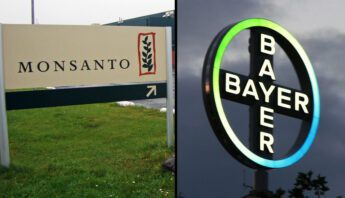We’ve been hearing rumours about possible mergers between pesticide/biotech corporations for a while now. Will Monsanto buy Syngenta? Or Bayer? Will the “Big 6” become the “Big 4” or “Big 3” — or perhaps one corporation to rule us all?
As the growth in some markets becomes less dependable and skepticism of genetically engineered (GE) crops grows, the next option to maintain market control is to merge into even bigger corporations. Now, it seems, there are real deals on the move — and our food system is about to become even more consolidated than it already is.
Late last year, Dow and DuPont announced their plans to merge. And following on the heals of that news, Syngenta accepted ChemChina’s $43 billion offer. Neither of these are yet a done deal.
Consolidating our food chain
As pointed out by the ETC Group, the Big 6 corporations — Monsanto, Dow, DuPont, Bayer, BASF and Syngenta — currently hold 75 percent of the world’s high-tech seed and pesticide business. Drilling down a bit more, just three companies (Monsanto, DuPont and Syngenta) control 55 percent of commercial seed sales and three companies (Syngenta, BASF and Bayer) control 51 percent of pesticide sales.
This astonishing degree of market control is thanks to unprecedented consolidation. In the 20 years since GE seeds were introduced, the Big 6 have collectively acquired at least 200 other seed or pesticide companies. Now they’re looking to acquire each other — or at the very least, join forces.
In 1996, Monsanto executive Robert Fraley famously said,
What you’re seeing is not just a consolidation of seed companies, it’s a consolidation of the entire food chain.”
Indeed. And the consolidation continues.
Farmers on the frontline
As my colleague Marcia Ishii-Eiteman wrote in 2010,
When a handful of corporations stand between 300 million consumers and two million farmers, neither farmers nor consumers are in a position to benefit from the corporate capture of our food system. It’s a question of power.”
She had just returned from testifying at a Department of Justice (DoJ) anti-trust hearing about corporate consolidation of food and agriculture. The hearings were also attended by thousands of farmers and ranchers, several of whom testified to the impacts of Big 6 market dominance.
Some of the issues farmers face include limited access to non-GE seed, sky-rocketing seed prices, increased dependence on costly pesticides (some resulting in serious health or environmental harms), and patent infringement lawsuits.
Monsanto, specifically, is known for bullying farmers with lawsuits. The seed giant has committed tremendous resources — 75 employees and a $10 million dollar budget as of 2003, according to a report from the Center for Food Safety — to watch-dog growers and pursue litigation. By the end of 2012, according to the report’s authors, Monsanto had received over $23.7 million from patent infringement lawsuits against farmers and farm businesses. This is likely just the tip of the ice berg, since “depicting the full scope of the industry’s pursuit of farmers is nearly impossible because many cases are settled by confidential out-of-court settlements.”
Through brute force, market manipulation and a powerful lobby, the Big 6 are pushing the pesticide treadmill faster and faster to sell more and more of their products.
Now what?
The DoJ did very little following the 2010 anti-trust hearings. That doesn’t bode well for requests from PAN, Food and Water Watch and many others to block the currently proposed mega-mergers. But there may be some reason for hope, as the ETC Group notes:
Recently, the U.S. Department of Justice has put its foot down on two big food company mergers, and Germany has tripped up a couple more. Shareholders can’t be certain the deals will go through.”
Stay tuned for more developments! And if you haven’t already, sign the petition urging DoJ to block the Dow/DuPont merger. The Big 6 haven’t become the “Fat 5” just yet.







